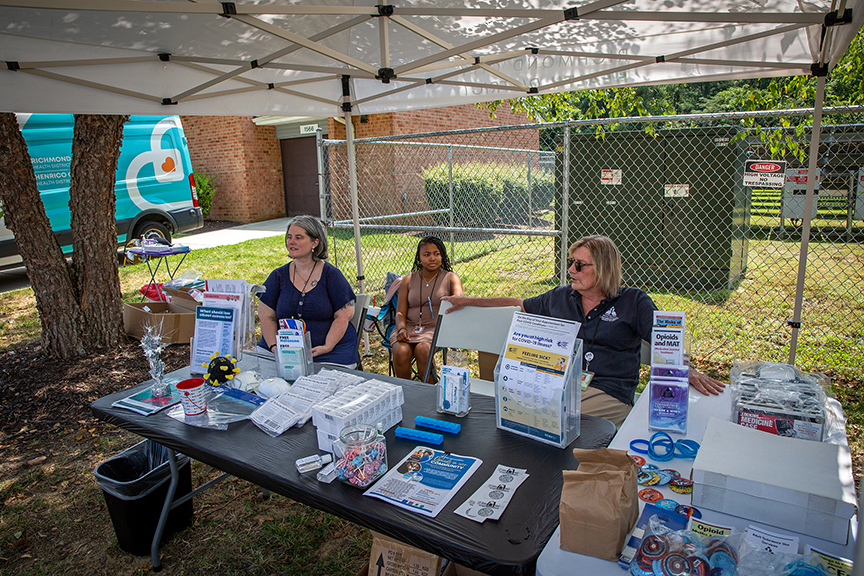County enhances programs to address damage caused by opioid epidemic
With the first wave of grants from the national opioid settlement, Henrico County is strengthening its programs and services for individuals working to recover from substance use disorder, particularly mothers and their children.
The Virginia Opioid Abatement Authority in June announced $23 million in grants to 76 cities and counties for opioid abatement and remediation efforts. The funds represent the state’s share of payments from manufacturers and distributors of prescription opioids in 2022.

Additional payments from settling companies are expected to be made for at least 16 more years and could exceed $1 billion, according to the authority.
This year, Henrico received three grants totaling $870,511. The bulk of the funding – $700,311 – is being used to provide an enhanced outpatient treatment program for women with substance use disorders who are also pregnant or parenting. Expected to start in September, the program will serve up to 30 women at a time as well as their children.
“What we’re trying to do is support these women on their recovery journeys and help them be the mothers they want to be,” said Leslie Stephen, who was recently promoted to assistant director of Henrico Area Mental Health & Development Services (MHDS). “This is an innovative approach that was developed with input from many people, including mothers in treatment, the recovery community, treatment and medical providers, law enforcement and the Department of Social Services.”
In addition to assisting with housing costs, as needed, the program will link the families with services based on an assessment of their needs, including medical, child care, transportation and behavioral health support. The program will be managed by a supervisor, two case managers and a peer support specialist.

“You think about those kids. It’s a preventative measure for the next generation,” Stephen said. “It’s not only treatment for the moms, but it’s prevention for the kids.”
Currently, only one recovery home in Henrico has space to accommodate a mother and a child. Stephen hopes that more recovery homes will begin to serve families now that funds will be available to pay the associated higher reimbursement rates.
“What we want is to have people come into services and start or continue their recovery journey,” she said.
While the program initially will serve residents of Henrico, New Kent and Charles City, it eventually could expand to other parts of the region. Henrico also received $100,000 to study the service gaps and resources needed to support pregnant and nursing mothers across the region, including the city of Richmond and the counties of Chesterfield and Hanover.
“The lack of resources specific to pregnant and parenting women with a substance use disorder is a big problem in our area,” Stephen said. “This study will allow the region to identify and then fill gaps in services.”

Additionally, Henrico received $70,200 to expand its office-based opioid treatment program to increase the availability of medication-assisted treatment for substance use. The funds will pay for additional prescriber hours.
“For now, the additional prescriber hours will be office-based, but our hope is to expand our mobile services,” Stephen said.
Since late April, MHDS has sent a mobile treatment unit one day per week to the Henrico Arms Apartments – an area identified through the county’s mapping of overdose “hot spots.” The pilot program was established in partnership with the Henrico Health District, which is providing use of a van outfitted as a medical clinic and staffed by a clinician, peer support specialist, nurse and prescriber.
In the mobile unit’s first three months, 160 individuals visited for services or resources, and staff distributed 87 doses of Narcan, a nasal spray drug that can temporarily revive someone following an opioid overdose. Among those served was a woman who was trained to administer Narcan three years ago and had used the medication six times to revive someone.
“She was excited to get more Narcan and share how helpful it was to have access to it,” Stephen said.
MHDS’ focus on addressing the residents’ needs appears to be paying off. Stephen said only one overdose has occurred at Henrico Arms since the mobile unit started in the spring. In the previous year, 40 overdoses were recorded within a mile of the community, she said.
“It’s a great partnership with the property management. Like us, they’re focused on community wellness,” Stephen said. “It’s really building those trusting relationships, so the residents who need help will come.”
Henrico’s efforts come as the opioid epidemic continues to take a heavy toll. In 2022, the county recorded 78 fatal overdoses from opioids and other drugs. That’s more than double the number of motor vehicle deaths (32) and homicides (30).







